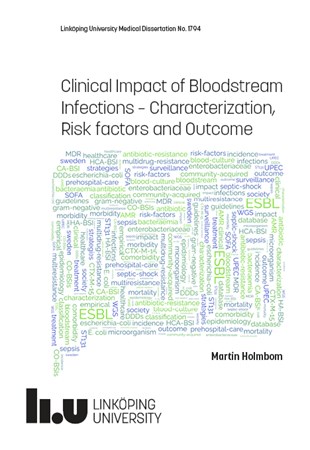Without bacteria-killing antibiotics, our healthcare system would be completely different. For example, care of prematurely born babies, advanced surgery, organ transplants and cancer treatment are all associated with an increased risk of infection. Today, the risk of infection is dealt with by using antibiotics. But antibiotic-resistant bacteria constitute a problem that is growing globally. Occurrence of blood infection is also increasing on a global level. It is against this background that Martin Holmbom and colleagues have studied the incidence of blood infection and antibiotic resistance, as well as the associated mortality rates, among Swedes living in Östergötland.
In the four studies that make up his dissertation, Martin Holmbom has found that rates of blood infection have grown in Östergötland. The studies cover various time periods from the year 2000 until 2016. The mortality rates from blood infection have also increased, something which can at least partially be explained by the fact that more older people with chronic illnesses have been affected.
The researchers have also investigated the development of antibiotic resistance in Östergötland. They have done this by analysing more than 9000 bacteria that caused blood infection during the years 2008–2016. They looked at how resistant the bacteria were, and at which incidences of blood infection resulted in death. The study found that the percentage of multi-resistant bacteria was low, but that it grew vigorously during the period. The researchers built on their findings by taking a closer look at exactly which factors are most strongly associated with death following blood infection.
“Even though we’ve seen an increase in multi-resistant bacteria in a Swedish population, this hasn’t been accompanied by an increase in mortality. Our studies found that the greatest risk factor for mortality is comorbidity involving several illnesses, as well as increased length of hospital stay”, says Martin Holmbom, who has newly been awarded a PhD at Linköping University’s Department of Biomedical and Clinical Sciences (BKV), and is a specialist doctor at Region Östergötland’s Urology Clinic.
Symptoms of blood infection and the serious condition blood poisoning, or sepsis, can vary widely and present differently from one patient to another. It can, therefore, be hard for both the patient and healthcare staff to estimate the initial seriousness of the infection, contributing potentially to a delay in lifesaving care. In the studies, mortality from blood infection was also found to be associated with advanced age.
Martin Holmbom believes that all signs point to an increase in multi-resistant bacteria, and that it is important to prioritise responses.
“Increased antibiotic resistance can have serious consequences and is, in my view, a big threat to global health. In general, Sweden’s use of antibiotics is low, and we have an advantageously low resistance due to several years of working to reduce the use of antibiotics with both people and animals. Despite this, we’re seeing an increase in antibiotic resistance – something which ought to set off alarm bells and tell us that we need to do more”, says Martin Holmbom.
Part of his dissertation work has involved building a database that is used to trace the development of antibiotic resistance and blood infections in the Östergötland region from the year 2000 onwards. The database can help give valuable information that can then be used to adjust recommendations for local antibiotic use to combat blood infections, as well as to follow the effectiveness of preventative measures. The region has also for several years had in place a “sepsis alarm” – a standardised set of routine procedures for healthcare around suspected blood poisoning.
Translation by Benjamin Davies
The dissertation: Clinical Impact of Bloodstream Infections – Characterization, Risk factors and Outcome, Martin Holmbom, Linköping University Medical Dissertation No. 1794

